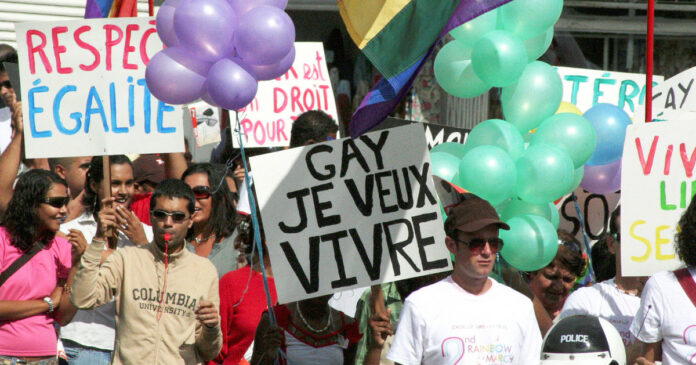PORT-LOUIS — The Supreme Court of Mauritius has struck out a colonial-era law criminalizing same-sex relations, bucking a trend elsewhere in Africa where a string of countries have passed or proposed anti-LGBTQ legislation.
In a ruling on two cases brought by members of the gay community in the Indian Ocean island nation, the court said section 250 of the Mauritian criminal code, which dated back to 1898 during British colonial rule, was unconstitutional.
“Section 250 was not introduced in Mauritius to reflect any indigenous Mauritian values but was inherited as part of our colonial history from Britain,” the court said in a ruling handed down on Wednesday.
For more from NBC Out, sign up for our weekly newsletter.
Jean-Daniel Wong, the manager of the Arc-en-Ciel Collective, the largest LGBTQ advocacy group in Mauritius, said the ruling was a huge relief.
“As an out gay man in Mauritius, personally, there was kind of this Damocles sword hanging over our head,” he told Reuters. “There is still a lot to do but … we have faith in our public institutions.”
He said the group’s next priorities were to achieve legal recognition for transgender people, legalize same-sex unions and fight hate crimes based on sexuality.
The government, the defendant in the cases, had said that while it was sympathetic to the arguments put forward by LGBT citizens, the values of wider society meant that the time was not right to change the law through parliament.
But the Supreme Court said the old law “criminalises the only natural way for the plaintiffs and other homosexual men to have sexual intercourse, whereas heterosexual men are permitted the right to have sexual intercourse in a way which is natural to them”.
UNAIDS, the United Nations agency in charge of combating the HIV/AIDS pandemic, said the ruling was an important step forward for public health and towards equal rights and respect for the LGBTQ community.
The Mauritian ruling stands in sharp contrast to developments elsewhere in Africa, most recently in Uganda which passed one of the world’s harshest anti-LGBTQ laws in May, imposing the death penalty for some same-sex acts.
Uganda’s move triggered an international outcry and prompted some donors to cut aid. But lawmakers in a number of other African countries including Kenya, Tanzania and South Sudan are working to bring in similar legislation.
Supporters of such laws say same-sex relations are unnatural and that Africans must resist what they see as the imposition of Western values. Rights groups regularly say anti-LGBTQ laws are not African but were imposed by former imperial powers.


